By Abel L Packer
The extent of national and international dimensions as determinants of performance of journals of Brazil dominated the program of the 4th Annual SciELO Meeting, held on December 2, at the FAPESP auditorium in São Paulo. Currently responsible for the communication of more than 25% of national scientific production indexed internationally, the journals of Brazil influence the country’s international scientometric ranking, positively in number of articles and negatively in citations per article.
Growth and impact of international Brazilian research
The Scientific Director of FAPESP, Carlos Henrique de Brito Cruz, examined the emergence and evolution of the situation in recent years with a number of illustrative graphs of growth and impact of Brazilian research indexed in the Web of Science (WoS) since the 80s1. Among them, it stands out the slide with graphs showing the difference in performance between the citations by Brazilian authors of articles published in journals in Brazil and abroad (Figure 1). Although recognizing that quality journals are not published by the sole purpose of obtaining citations, Brito Cruz emphasized the importance of national journals in increasing the impact of Brazilian science. He also pointed out that increasing the international visibility of journals of Brazil is a target of SciELO from its origins.
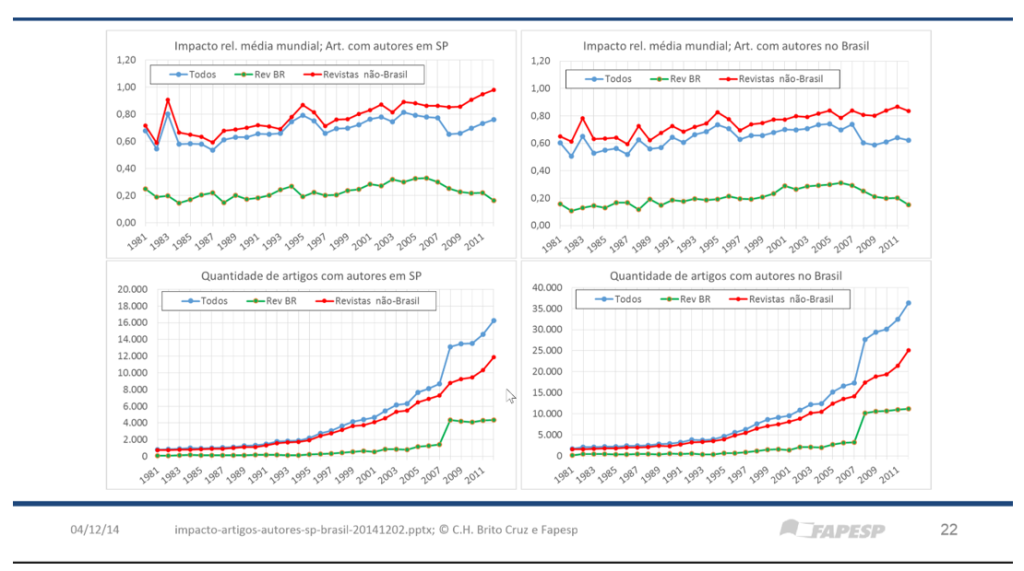 Figure 1. Impact and amount of papers from authors of São Paulo and of Brazil in Brazilian and foreign journals. (Source: C. H. Brito Cruz¹)
Figure 1. Impact and amount of papers from authors of São Paulo and of Brazil in Brazilian and foreign journals. (Source: C. H. Brito Cruz¹)
National and international research cited in SciELO journals
Rogerio Mugnaini2 mapped SciELO journals of Brazil according to the national or foreign origin of citations they received in 2013 (impact) and according to the national or foreign destination of citations granted by those journals (information consumption). Restricting the national dimension (origin or destination of citations) to SciELO journals and the international dimension to WoS non- SciELO journals, Mugnaini categorized into 5 groups the national and/or international centrality of the journals: predominantly international (up to 20% SciELO citations) international (from 20% to 40% SciELO citations), intermediate (between 40% and 60% SciELO citations), national (from 60% to 80% SciELO citations) and predominantly national (over 80% SciELO citations). Table 1 shows the distribution of SciELO journals according to impact and consumption of information according to these five categories. This categorization will help to guide the adaptation of national and international dimensions in the development of the composition of SciELO Brazil collection.
Table 1. Distribution of journals by national and international categories according to received citations (impact) and citations given (consumption) in the SciELO Citation Index. (Source: R Mugnaini²)
Impact of journals focused on national research communication
Rogerio Meneghini3, Scientific Director of SciELO, analyzed the extent of use of journals as vehicles to communicate national research. Meneghini highlighted as reference the journals of Nordic countries indexed in WoS in 2012 which published less than 20% of national papers in contrast to journals from BICSS countries (Brazil, India, China, South Africa, South Korea) which have published more than 50% of national papers, especially Brazil and China with 83% each. He ranked BICSS countries according to the number of citations per paper their journals received in 2012 considering the articles published in 2010 and 2011. Combining the total citations received and its categorization into domestic and citations coming from abroad to the total number of articles and written in English, it resulted in 6 rankings as shown in Table 2. China and South Korea are leading in all rankings. Brazil has better performance with articles in English, which in 2012 accounted for 50% of the articles indexed in WoS.
Table 2. Classification according to Citing Articles in 2012 to Articles of 2010-2011 and Classification according to Citing Articles in 2012 to Articles of 2010-2011 (Articles in English). (Source: R Meneghini²)
Determinants of performance and internationalization of the journals of Brazil
The causes and barriers that limit the advancement of the international presence of the journals of Brazil according to citation metrics their articles receive is well known. Among them is the stratification of journals in the Qualis system, which decides in advance the impact of the research published in those journals, independently of the actual performance that they may have. At the same time, it tends to crystallize the impact of journals. The recognition of value of the research for the simple ability to publish in well-ranked journals and not by the real impact of the articles seems to have stimulated the increase in the number of Brazilian publications in line with the so-called scientific productivism at the expense of the articles’ potential to get citations. It is certainly crucial in the performance by citations the relevance of published research and the quality of articles, which is, in large part, determined by the rigor and careful evaluation of manuscripts. Other key and persistent causes of low performance of international journals in Brazil are: publication of articles in Portuguese, prevalence of 80% of Brazilian authorship, low percentage of multinational collaboration articles among papers with foreign authorship and the recent presence in international indices. The behavior of citations, it is worth recalling, varies according to the thematic areas and indexes used.
The internationalization of journals is one of the lines of action that SciELO is promoting as a priority in recent years along with the strengthening of professionalization and financial sustainability. The achievement of these lines of action is considered essential by the program for increasing the efficiency and quality of the publishing process, publication and dissemination of indexed journals following the international state of the art as a necessary condition for a jump in visibility and national and international credibility. Accordingly, the new SciELO indexing criteria are aligned with the implementation of new lines of action and start to have a decisive influence on the future configuration of the collection, i.e. the admission of new journals as well as the permanence of already indexed ones.
In the same way SciELO is continually evaluating its performance in meeting the objectives of contributing to increase the visibility of its indexed journals, publishers and editors of journals SciELO indexes or those who intend to submit new journals for indexing are also asked to evaluate the new criteria and how their journals can contribute to its implementation and improvement of the process. It is important to recognize that despite the deadlines extend for the next 2-5 years, the new criteria published last October represent a challenge for many journals.
Also in the field of internationalization of journals of Brazil, CAPES has organized at the end of last October a meeting at its headquarters with representatives of a group of international commercial publishers and a selection of Brazilian journal editors in order to inform the forwarding of an internationalization proposal by publishing 100 journals by one of the guest publishers. The Brazilian Association of Scientific Editors (ABEC) and SciELO reacted to CAPES initiative with a public statement4 in which they question the perspective of internationalization by the simple publication by an international publisher and propose that the positive initiative of CAPES to hold a large investment in journals of Brazil comes to be oriented to the development of national infrastructure and publishing capabilities of scientific publication. Besides ABEC and SciELO, other manifestations took place, especially regarding the declaration of public health journals indexed in SciELO5, which presented a series of questions about the new SciELO criteria and argued that funding agencies adopt a comprehensive approach to support the communication of research through journals of Brazil.
Grounds and implementation of SciELO Indexing Criteria
The grounds and implementation of SciELO indexing criteria were the topics of my presentation in the meeting6. SciELO indexing criteria have always been characterized by three grounds: (a) to follow the standards and state of the art in scientific communication, among which is the selective indexing based on the evaluation of the publications’ performance; (b) to guide the application of the criteria for the development of quality journals and contribute to the improvement of their performance without interfering with the policies and management thereof; and (c) transparent application supported by an advisory committee formed by representatives of publishers and major institutions supporting research and scientific communication in Brazil. In line with these grounds the new criteria embody two major innovations. The first focuses the assessment of the journal on the contribution that it brings the performance of the collection as a whole and of the subject area to which it belongs and the second is aligned to the expected advancement of professionalization, internationalization and financial sustainability. The entering of new journals and the permanence of already indexed ones will be evaluated on the basis of collection of journals’ performance of their discipline and the collection as a whole, beyond their individual characteristics especially when it comes to professionalization. The criteria vary according to the function and applicability: some represent expectations, for example, the progressive increase in the number of citations or downloads, others are mandatory, such as XML formatting and web-based review of the manuscripts, and also, others have minimum and recommended percentages for all journals and by subject area that must be met in the coming years, as it is, for example, publication in English, a criteria that requires a minimum percentage of 60% and a suggested percentage of 75% from 2016. The latter criterion was exemplified with the help of Figure 2 which shows the evolution of the percentage of articles in English in the last five years, a trend pointing to 66% in 2016, i.e., only 7% below the recommended percentage.
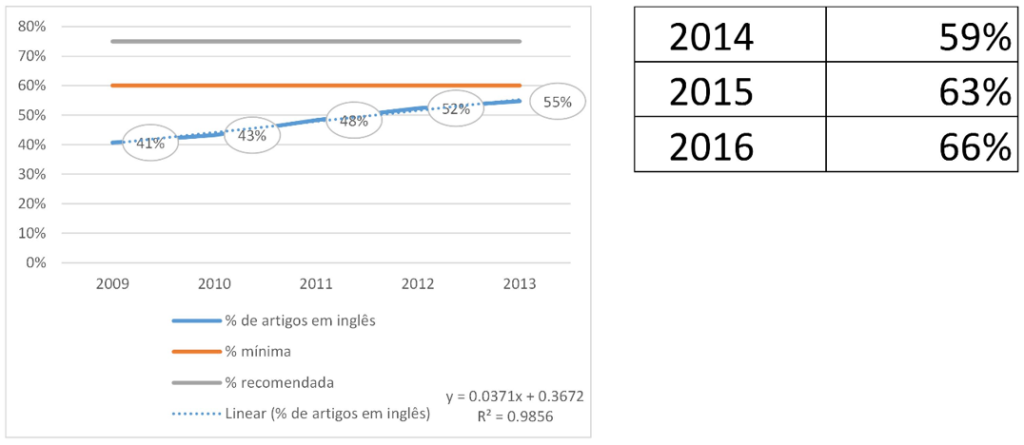 Figure 2. Evolution of articles in English in SciELO Brazil between 2009 and 2013 and future trend. (Source: A L Packer6)
Figure 2. Evolution of articles in English in SciELO Brazil between 2009 and 2013 and future trend. (Source: A L Packer6)
Publisher’s role in improving journals
Besides SciELO efforts, the advancement of journals and the progressive adoption of new indexing criteria requires decisive action by publishers and editors. They are responsible for the performance of journals and for political and editorial management positioning regarding professionalization, internationalization and financial sustainability of their operation. In order to analyze these aspects and challenges of this positioning the second part of the meeting was devoted to an editors’ panel.
What features a prestigious international journal
Hooman Momen7, until recently editor of the Bulletin of the World Health Organization, today representing Memórias do Instituto Oswaldo Cruz, presented the features that best identify prestigious international journals, especially those listed in the slide Figure 3. Citing the example of journals published in South Korea, Momen advocated the establishment of a technologically advanced platform for editing and publishing journals of Brazil as a necessary and essential step to bring journals to the state of the art and strengthen international competitiveness. In his remarks he highlighted that SciELO may ultimately be responsible for the afore mentioned platform operation.
Figure 3. Characteristics of prestigious international journals. (Source: H Momen7)
Perfecting an international journal in Brazil
Carlos Menck8, editor of Genetics and Molecular Biology (GMB), shared his editor-in-chief and his editorial staff experience at the process of improvement of GMB as an international Brazilian journal. Among the decisions and major progress he highlighted the publication in English from the first number, the name changes (Revista Brasileira de Genética and Brazilian Journal of Genetics to Genetics and Molecular Biology), the editorial management focused on the rigor on manuscripts assessment, which is reflected by the over 80% rejection rate of manuscripts, the pioneering adoption of the XML tagging to achieve indexing in PubMed and the growing publishing of authors with foreign affiliation which reached 54% in 2013. It is worth mentioning among the improvements of the editorial management the reduced processing time of the manuscripts with a median of 4 months, which positions GMB with high international competitiveness. The performance of the GMB shows positive indicators in citations received, very low self-citation, increased number of cited documents, with special issues reaching more impact. According to Menck, the increased performance and internationalization of GMB occurs in a highly competitive environment characterized by increasing commercialization of open access and demand of competitive publication conditions in the level of international publishers.
The difficult balance of the local and the global in journals in the humanities and social sciences
Nelson Sanjad9, editor of Boletim do Museu Paraense Emílio Goeldi. Ciências Humanas, from the analysis of five questions gave a broad and well-informed overview of current conditions and challenges that permeates the improvement of journals in the humanities and social sciences. Among them, he highlighted: the limitations of editorial teams affect the management of the production of journals; the cultural, social, academic and financial context that favors the publication in Portuguese; the internationalization of the editorial management is not perceived as a natural, necessary and possible progression; limitations that affect the quality of scientific/academic research in the humanities and social areas are barriers to internationalization; and, it is essential to address the solutions that threaten future sustainability of journals in Brazil. The slide of Figure 4 summarizes much of the Sanjad’s exposure.
Figure 4. Points for reflection on the future of the journals of Humanities and Social Sciences (Source: N Sanjad9)
ABEC and the international insertion of journals of Brazil
Closing the presentations of the editors panel, Sigmar de Mello Rode, President of ABEC and until recently editor of Brazilian Oral Research, presented the contributions that the ABEC has been doing to expand and strengthen the international position of journals of Brazil and highlighted, among other things, participation in committees, organizing events that discuss the state of the art in international scientific editing and publishing and the association with international organizations supporting scientific communication such as the Council of Scientific Editors (CSE), the Committee on Publications Ethics (COPE) and CrossRef. Together with CSE, ABEC and SciELO are starting an editor certification program and with CrossRef, ABEC is signing up a large number of DOI records and the use of iThenticate (plagiarism detector) for associated journals. ABEC also participates actively in the discussions of controversial scientific communication issues such as the identification of authorship. At the end, Rode announced the XV Meeting of Scientific Editors, to be held in November 2015, when ABEC celebrates its 30 years of operation.
The debate goes on…
The 4th Annual SciELO Meeting fulfilled the objectives to socialize and discuss issues that affect the program’s performance and the journals it indexes. With over 200 participants, the meeting fulfilled the agenda of proposed topics related to the implementation of the new indexing criteria.
The new SciELO criteria formalize the monitoring of the implementation of the priority lines of action of professionalization, internationalization and financial sustainability, which, in turn, design a common, multidisciplinary, cooperative and efficient space for indexing and publishing centered on the improvement of journals of different thematic areas and disciplines. The inclusion of journals in the international flow of scientific communication is projected as a proactive action that involves on the one hand, Brazil’s contribution to the global scientific communication and, secondly, the contribution to the disclosure of a significant and important part of the national research.
The fulfillment of the advances proposed by SciELO depends on the decisive participation of the editors, starting with the analysis and discussion of the new criteria, so that its adoption favors the improvement of the journals in the context of its mission, disciplines and communities involved. Such participation can start, as it was recommended at the meeting, by expliciting the positions, expectations and plans of publishers and editors of journals or a set of them. Among the different spaces and means that can promote this debate, the SciELO in Perspective Blog is open to the contributions of the community of editors, researchers, information and scientific communication professionals, etc.
Tribute to Prof. Dr. Lewis J. Greene
An important and special time of the meeting was dedicated to honoring Lewis Joel Greene who turned 80 in August 2014 and 30 years in charge of the Brazilian Journal of Medical and Biological Research. A founder of ABEC and promoter of the creation of SciELO, Greene enriched his prolific scientific career with scientific publishing of one of the reference journals in Brazil and a valuable contribution to the progress of scientific communication in Brazil. A summary of Dr. Greene’s life dedicated to science and scientific editing was shared in a video shown at the meeting.
Notes
1 CRUZ, C.H.B. Sobre o impacto dos artigos científicos de autores no Brasil. In: IV Reunião Anual SciELO, São Paulo, 2014. 373 slides. Available from: http://pt.slideshare.net/scielo/sobre-o-impacto-dos-artigos-cientficos-de-autores-no-brasil
2 MUGNAINI, R. Dimensões nacional e internacional do impacto e consumo de informação dos periódicos SciELO Brasil. In: IV Reunião Anual SciELO, São Paulo, 2014. 15 slides. Available from: http://pt.slideshare.net/scielo/2014-mugnaini-scielo
3 MENEGHINI, R. “Periódicos Nacionais”: Dando Vazão à Produção Científica Nacional. In: IV Reunião Anual SciELO, São Paulo, 2014. 12 slides. Available from: http://pt.slideshare.net/scielo/rogerio-meneghini-apresentao-fapesp-scielo-dez-2014
4 ABEC Brazil and SciELO request the reformulation of the announced plan by CAPES to publicly finance publication of journals of Brazil by a foreign publisher. SciELO in Perspective. [viewed 10 December 2014]. Available from: http://blog.scielo.org/en/2014/11/19/abec-brazil-and-scielo-request-the-reformulation-of-the-announced-plan-by-capes-to-publicly-finance-publication-of-journals-of-brazil-by-a-foreign-publisher/
5 Fórum de Editores de Saúde Coletiva contesta proposta de novos critérios do Portal SciELO.Abrasco. [viewed 10 December 2014]. Available from: http://www.abrasco.org.br/site/wp-content/uploads/2014/11/Nota-Forum-de-Editores-de-Saude-Coletiva-_2014-11-18.pdf
6 PACKER, A.L. Critérios de Indexação do SciELO, edição setembro 2014. In: IV Reunião Anual SciELO, São Paulo, 2014. 18 slides. Available from: http://pt.slideshare.net/scielo/sci-elo-critrios-de-indexao2014a3
7 MOMEN, H. O que caracteriza um periódico de prestigio internacional. In: IV Reunião Anual SciELO, São Paulo, 2014. 7 slides. Available from: http://pt.slideshare.net/scielo/hooman-momen-o-que-caracteriza-um-peridico-de-prestigio-internacional
8 MENCK, C.F.M. Desafio de fazer um periódico acadêmico internacional no Brasil – O Caso da Genetics and Molecular Biology. In: IV Reunião Anual SciELO, São Paulo, 2014. 37 slides. Available from: http://pt.slideshare.net/scielo/carlos-menck-gmb-as-international-122014
9 SANJAD, N. Local / universal: questões e desafios para os periódicos das ciências humanas e sociais. In: IV Reunião Anual SciELO, São Paulo, 2014. 12 slides. Available from: http://pt.slideshare.net/scielo/nelson-sanjad-reuniao-anualscielo-sanjad
Como citar este post [ISO 690/2010]:




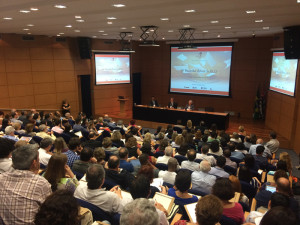


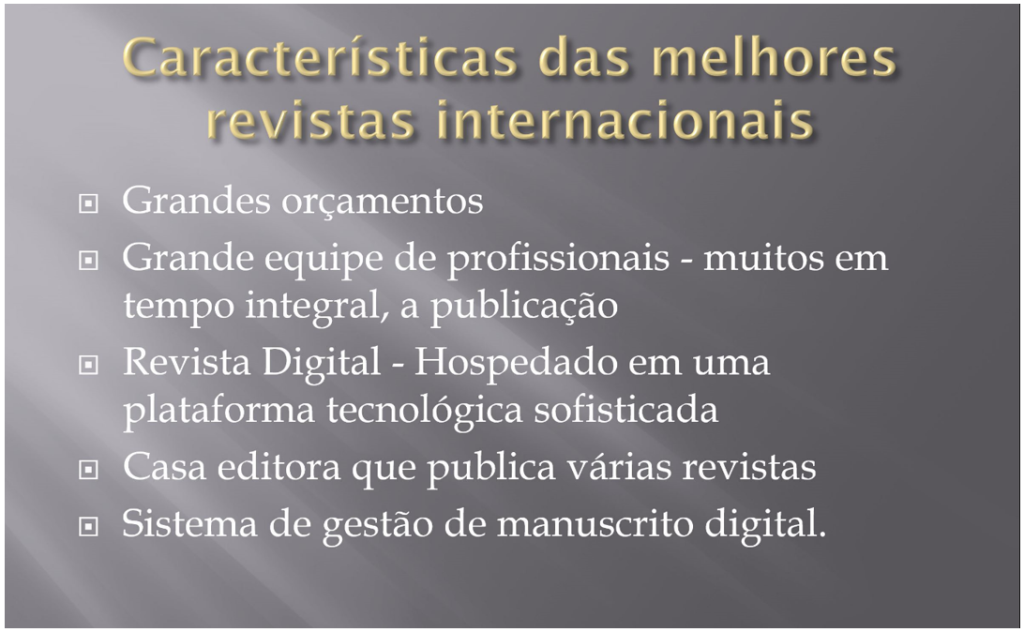
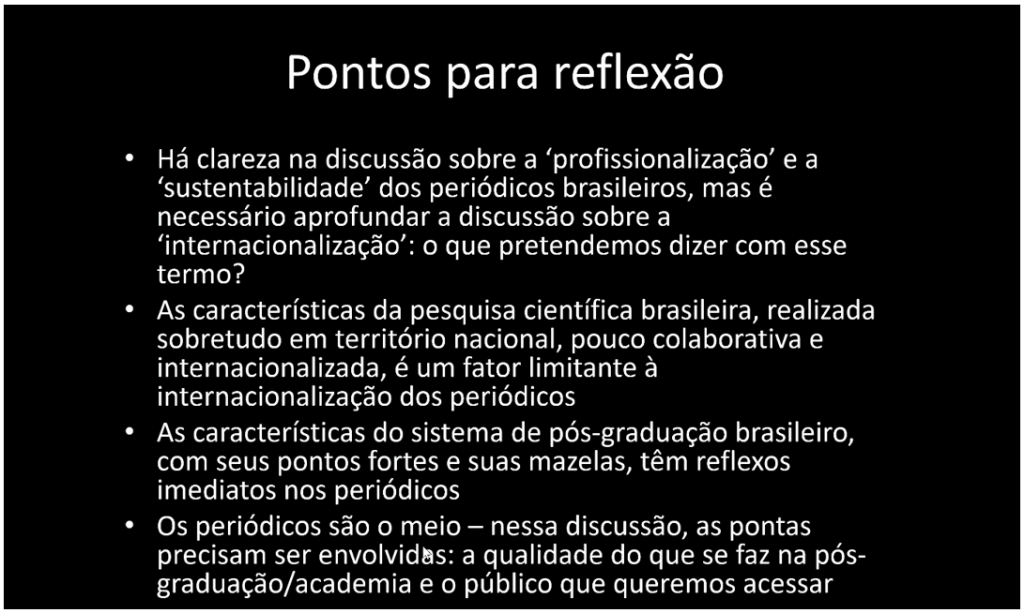




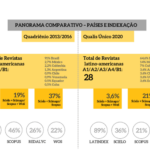








Read comment in Portuguese, by Cid Aimbiré de Moraes Santos: http://blog.scielo.org/blog/2014/12/16/a-internacionalizacao-dos-periodicos-foi-tema-central-da-iv-reuniao-anual-do-scielo/#comment-9893